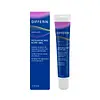What's inside
What's inside
 Key Ingredients
Key Ingredients

 Benefits
Benefits

 Concerns
Concerns

No concerns
 Ingredients Side-by-side
Ingredients Side-by-side

Dimethicone
EmollientHelianthus Annuus Seed Wax
Skin ConditioningCaprylic/Capric Triglyceride
MaskingDimethicone Crosspolymer
Emulsion StabilisingC10-18 Triglycerides
EmollientButyrospermum Parkii Butter
Skin ConditioningC13-15 Alkane
SolventBeeswax
Emulsion StabilisingCocos Nucifera Oil
MaskingAsiaticoside
AntioxidantMadecassic Acid
Skin ConditioningAsiatic Acid
Skin ConditioningBisabolol
MaskingCetyl PEG/PPG-10/1 Dimethicone
EmulsifyingDimethicone/Vinyl Dimethicone Crosspolymer
Skin ConditioningOryza Sativa Bran Extract
Skin ConditioningHelianthus Annuus Extract
EmollientRosmarinus Officinalis Leaf Extract
AntimicrobialTocopherol
AntioxidantWater
Skin ConditioningAlcohol
AntimicrobialCitric Acid
BufferingDimethicone, Helianthus Annuus Seed Wax, Caprylic/Capric Triglyceride, Dimethicone Crosspolymer, C10-18 Triglycerides, Butyrospermum Parkii Butter, C13-15 Alkane, Beeswax, Cocos Nucifera Oil, Asiaticoside, Madecassic Acid, Asiatic Acid, Bisabolol, Cetyl PEG/PPG-10/1 Dimethicone, Dimethicone/Vinyl Dimethicone Crosspolymer, Oryza Sativa Bran Extract, Helianthus Annuus Extract, Rosmarinus Officinalis Leaf Extract, Tocopherol, Water, Alcohol, Citric Acid
Water
Skin ConditioningDimethicone
EmollientDimethicone Crosspolymer
Emulsion StabilisingCaprylic/Capric Triglyceride
MaskingBis-PEG-12 Dimethicone
EmollientGlyceryl Oleate Citrate
EmulsifyingEthoxydiglycol
HumectantBakuchiol
AntimicrobialDextran
Hippophae Rhamnoides Fruit Oil
Skin ProtectingHippophae Rhamnoides Seed Oil
Skin ProtectingAsiatic Acid
Skin ConditioningAsiaticoside
AntioxidantRosa Rubiginosa Seed Oil
EmollientButylene Glycol
HumectantHydrogenated Ethylhexyl Olivate
EmollientPhenoxyethanol
PreservativeAcrylates/C10-30 Alkyl Acrylate Crosspolymer
Emulsion StabilisingCitric Acid
BufferingSodium Hydroxide
BufferingTocopheryl Acetate
AntioxidantEthylhexylglycerin
Skin ConditioningDisodium EDTA
Squalane
EmollientMadecassic Acid
Skin ConditioningTripeptide-1
Skin ConditioningWater, Dimethicone, Dimethicone Crosspolymer, Caprylic/Capric Triglyceride, Bis-PEG-12 Dimethicone, Glyceryl Oleate Citrate, Ethoxydiglycol, Bakuchiol, Dextran, Hippophae Rhamnoides Fruit Oil, Hippophae Rhamnoides Seed Oil, Asiatic Acid, Asiaticoside, Rosa Rubiginosa Seed Oil, Butylene Glycol, Hydrogenated Ethylhexyl Olivate, Phenoxyethanol, Acrylates/C10-30 Alkyl Acrylate Crosspolymer, Citric Acid, Sodium Hydroxide, Tocopheryl Acetate, Ethylhexylglycerin, Disodium EDTA, Squalane, Madecassic Acid, Tripeptide-1
 Reviews
Reviews

Ingredients Explained
These ingredients are found in both products.
Ingredients higher up in an ingredient list are typically present in a larger amount.
Asiatic Acid is a major component of Centella Asiatica Extract. It has wound-healing, anti-inflammatory, and antioxidant properties.
Studies show Asiatic Acid is able to block the pathway for skin inflammation receptors, helping to soothe skin.
As an antioxidant, asiatic acid helps protect our skin against damaging environmental factors.
Learn more about Asiatic AcidAsiaticoside comes from the super popular skin-soothing ingredient, Centella asiatica. It is one of four active compounds found in the extract of Centella Asiatica.
Asiaticoside is an antioxidant and helps with wound healing. It has been shown to increase antioxidant activity during the wound healing process.
This ingredient is an emollient, solvent, and texture enhancer. It is considered a skin-softener by helping the skin prevent moisture loss.
It helps thicken a product's formula and makes it easier to spread by dissolving clumping compounds.
Caprylic Triglyceride is made by combining glycerin with coconut oil, forming a clear liquid.
While there is an assumption Caprylic Triglyceride can clog pores due to it being derived from coconut oil, there is no research supporting this.
Learn more about Caprylic/Capric TriglycerideCitric Acid is an alpha hydroxy acid (AHA) naturally found in citrus fruits like oranges, lemons, and limes.
Like other AHAs, citric acid can exfoliate skin by breaking down the bonds that hold dead skin cells together. This helps reveal smoother and brighter skin underneath.
However, this exfoliating effect only happens at high concentrations (20%) which can be hard to find in cosmetic products.
Due to this, citric acid is usually included in small amounts as a pH adjuster. This helps keep products slightly more acidic and compatible with skin's natural pH.
In skincare formulas, citric acid can:
While it can provide some skin benefits, research shows lactic acid and glycolic acid are generally more effective and less irritating exfoliants.
Most citric acid used in skincare today is made by fermenting sugars (usually from molasses). This synthetic version is identical to the natural citrus form but easier to stabilize and use in formulations.
Read more about some other popular AHA's here:
Learn more about Citric AcidDimethicone is a type of synthetic silicone created from natural materials such as quartz.
What it does:
Dimethicone comes in different viscosities:
Depending on the viscosity, dimethicone has different properties.
Ingredients lists don't always show which type is used, so we recommend reaching out to the brand if you have questions about the viscosity.
This ingredient is unlikely to cause irritation because it does not get absorbed into skin. However, people with silicone allergies should be careful about using this ingredient.
Note: Dimethicone may contribute to pilling. This is because it is not oil or water soluble, so pilling may occur when layered with products. When mixed with heavy oils in a formula, the outcome is also quite greasy.
Learn more about DimethiconeDimethicone Crosspolymer is a silicone created by modifying dimethicone with hydrocarbon side chains. Due to its large size, it does not penetrate skin. It is considered non-occlusive.
Dimethicone Crosspolymer is used to stabilize and thicken products. It also helps give products a silky feel.
Madecassic Acid is a major component of Centella Asiatica Extract. It has anti-inflammatory and antioxidant properties.
It is a triterpenoid, meaning it naturally acts as an antioxidant. Antioxidants protect your skin against damage from environmental factors such as pollution and UV.
Studies show Madecassic Acid helps soothe the skin due to its ability to block inflammation pathways.
Learn more about Madecassic AcidWater. It's the most common cosmetic ingredient of all. You'll usually see it at the top of ingredient lists, meaning that it makes up the largest part of the product.
So why is it so popular? Water most often acts as a solvent - this means that it helps dissolve other ingredients into the formulation.
You'll also recognize water as that liquid we all need to stay alive. If you see this, drink a glass of water. Stay hydrated!
Learn more about Water